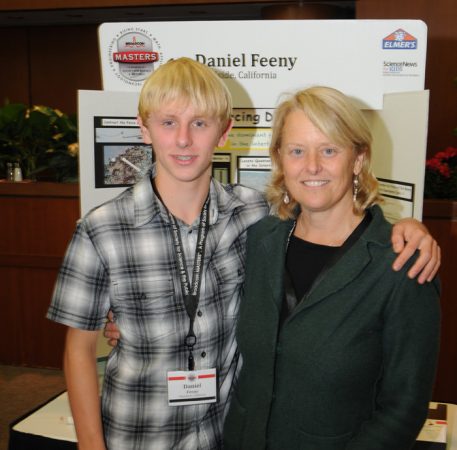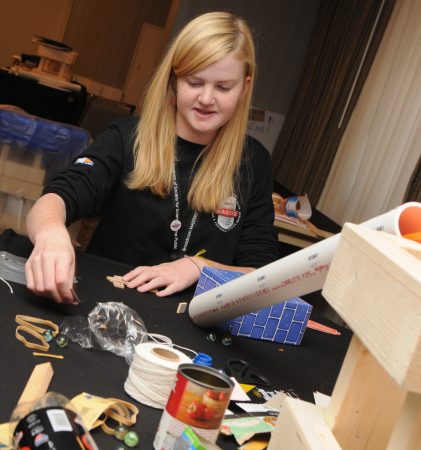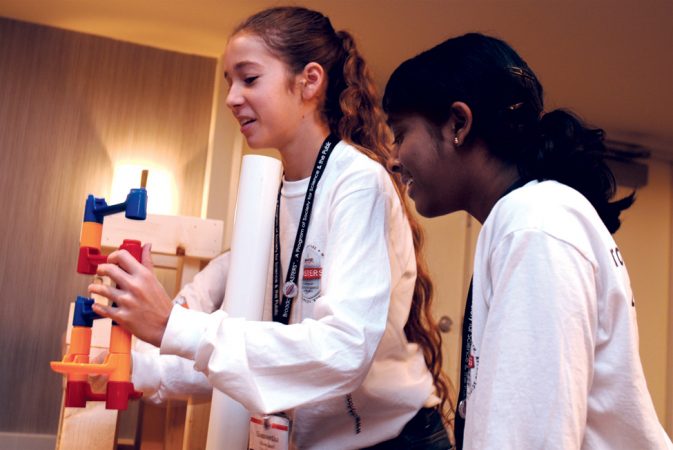Science fair as a family affair
Parents share their tips on helping kids prepare for a science fair

As temperatures drop and days grow shorter, middle and high school students across the country begin gearing up for science fair season. While these competitions typically take place in the spring, the qualifying projects can take several weeks or even months to plan, carry out and summarize. That means late fall and early winter are an ideal time for students to start brainstorming project ideas.
But science fair planning can overwhelm many students. Some become intimidated at the prospect of designing a project that’s never been done before. For others, this event may be their first experience in long-term project coordination. And for parents, it’s often a time spent wondering how best to help their children without taking over the project themselves.
The good news is that a student’s own interests can lay the groundwork for a great science fair project, according to the parents of several students who participated in the Broadcom MASTERS science competition, held in Washington, D.C., this past October. And, these parents agree, once students have a project in mind, moms and dads can step into the roles of mentors and facilitators — giving advice and keeping their children on track, but letting the kids do the work themselves.
“Parents are usually in the best situation to know what fascinates and inspires their kids,” says Kathleen Bethel, whose daughter Meagan studied Arizona’s wildcat population for her science fair project.
By knowing a kid’s interests, Bethel says, parents often can help steer students toward projects that will prove personally meaningful. “Really, in everyday life, do they stand around and think, ‘I wonder if my mom’s washing detergent works best?’” she quips. While a question like that might make for a straightforward science fair project, she says, it’s not a topic most kids would get excited about, or one that would impress judges for its creativity.
Plus, students who truly care about their science fair projects tend to be naturally motivated to put in long hours. “What they love is what they’re really going to work on,” says Bridget Hylak, whose son Benjamin placed second overall in the competition. “And, as parents, we want to encourage that, because we won’t have to be as involved.”
Inspiration from extracurricular activities
For some students, science fair project ideas come easily from hobbies and other interests. Hylak’s son Benjamin, for example, is passionate about computer programming and building robots. He turned that fascination into an interactive robot that helped him earn high marks in the competition.
Of course, not all hobbies obviously translate into science projects — at least not at first glance. Another suggestion for parents: Think about what your kids do outside of school, says Michele Glidden, director of science education programs for Society for Science & the Public, which publishes Science News for Kids and cosponsored the Broadcom MASTERS competition. Activities such as sports, dance and music can all be approached scientifically, she notes.
“A kid could look at the physics of a soccer ball, or the psychology of why you get up at 5 a.m. for swim practice,” she says. “If they start with something they already know in an outside activity and think, ‘How can I do a project about that?’ they’ll find the science in it.”
Still another approach to finding a science fair idea is to consider challenges in everyday life and their possible solutions, says Sanjay Patel, whose son Nikhil experimented with methods for helping plants tolerate subfreezing overnight temperatures.
“Nikhil hates doing yard work,” his father explains. “Every year, some of our garden plants die over the winter. So I told him, find a way to keep these plants alive over the winter, and maybe we won’t have to replant them next summer.”
Foster curiosity and solving puzzles
Another tip: Encourage questioning and problem-solving all year long, says Bill Wallace, a science teacher at Georgetown Day School in Washington, D.C., and one of the judges for the Broadcom MASTERS competition.
“Asking questions is such an overlooked skill in what it is to be a good scientist,” he says. “And curiosity is really a character trait that every parent and every school needs to foster in kids. Just to get out and ask questions about why it is so.”

To encourage curiosity, Wallace suggests parents expose kids to as many things as possible: Go on hikes, visit museums and other science centers, read books together, and then talk about the experience.
“Have a discussion with your kids,” Wallace says. “If you spend time outdoors, ask: ‘Did you notice this tree is taller than that one? Why do you think that is?’”
Bethel, who also directs the Southern Arizona Regional Science and Engineering Fair, sees this approach as analogous to the kind of coaching student athletes receive. Think of it as off-season conditioning to help students arrive at science fair time with their minds primed to generate project ideas, she says.
“Most parents would never send their kids out on the sports field without practice and coaching,” she says. “With sports practice, you’ve got a coach telling how to throw, how to run.” Kids need that kind of feedback, whether it’s in sports or academics, she says. “They need someone to practice with and help them know they’re on the right track.”
When frustrations arise
Parents also can play a key role in helping their kids cope with the frustrations of research. Sometimes experiments don’t give expected results, equipment fails or students think of a better research question halfway through their project.
Christina Feeney’s son Daniel, for example, compared tide pool biodiversity with the force of waves along a stretch of California coast. The fieldwork could be frustrating, she acknowledged. He built his own force meters, which didn’t always work, and sometimes they washed out to sea before he could record measurements.
“He kept getting so discouraged,” Feeney says. “But I told him that’s what science is — it’s hard. Just to not let your kid get discouraged is so helpful.”

“It’s the nonscience aspects — coping with setbacks and finding ways to adapt and change your problem statement — that they really learn from doing a science fair,” adds Pratheep Balasingam, whose daughter Namrata experimented with the physics of balloons.
Several parents encouraged their kids to seek out answers to their questions online. Numerous scientific societies, for example, offer “ask a scientist” portals where kids can pose questions and receive answers within a few days.
Though searching online for answers can quickly become overwhelming, parents can step in and help their kids figure out how to sift through the mountains of information they may uncover, Feeney says.
“As a parent, I’d read along with Daniel as he researched online and help him weed out possible sites, places that were too complex,” she says.
“There’s a lot of training involved in research,” Patel says. Using the right search terms in Google, and assessing website credibility are two skills where students are likely to need some help.
And, Patel adds, “You have to work to keep them from going on a tangent and doing something that’s not productive.”
Learning about time management
At the same time, it’s vitally important that students do their projects themselves. “You can’t go in there and try to manage it for them,” Feeney notes. “That just ruins their self-esteem.”
But, she acknowledged, they do need guidance and direction when it comes to setting aside time to work on a project that can stretch out over weeks. “They don’t quite have that ability to see to the end of where they’re going,” Feeney says.
That’s often where a parent’s experience can help, especially for sixth- to eight-grade students who might lack experience in long-term project planning, says Hylak.
“I helped [my son] where he could use help,” she says, referring to her role largely as a project manager — checking in, making sure he was staying on task. “His strength is in engineering and the technical aspects, but he’s not yet good at keeping himself organized.”
“Scientific research is a long-term process,” adds Patel. “It’s much better to work on a project in small amounts of time over a long period than a large amount of time over a short period,” he says.
For students who also participate in extracurricular activities, such as sports, music or dance classes, it can be especially hard to come home after a long day only to work on the minutia of a science project. And that’s when a parent’s coaching can really pay off.
Carrie Rowland’s daughter, Samantha, counted the number of needles that fell from Christmas trees exposed to different kinds of lights. Rowland recalls her daughter stomping in frustration to the basement to count needles late in the evenings after basketball practice.
“I tried to be a cheerleader and remind her it was her decision to do this project,” Rowland says. She, her husband and Samantha’s 9-year-old brother would often join her in the basement on those late nights, keeping her company as she counted thousands of tree needles.
“She didn’t necessarily need us to do anything, but I think it made her feel better that we were all there with her,” Rowland says. “We would say, ‘Come on, you can do this.’ That seemed to give her a little boost.”
And for kids who need even more inspiration to put their best effort into a science fair project, Patel offers a story about his older son, Neel, who bought a car at age 16 using the money he won at science competitions since middle school.
“He literally won a car with the awards he’s won,” Patel says. “Now his siblings are saying, ‘Hey, he bought a car. I bet if I work hard I can buy one, too.’ It’s a great motivator.”
The Broadcom MASTERS competition is cosponsored by Society for Science & the Public, publisher of Science News for Kids.